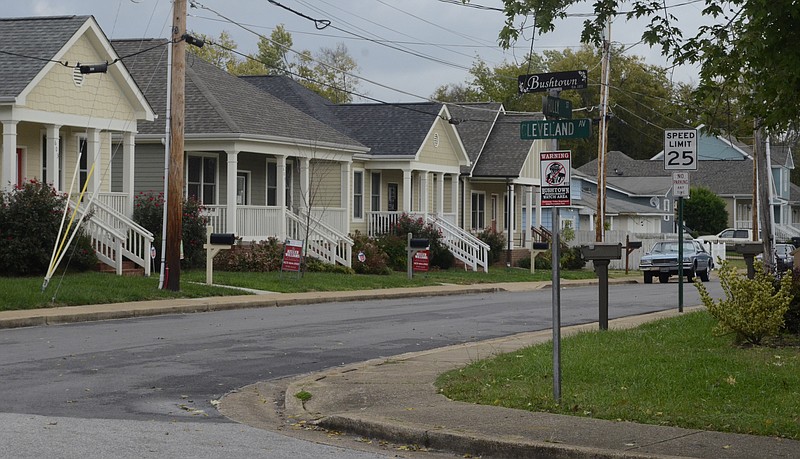The head of Chattanooga Neighborhood Enterprise sees issues with foreclosure and damaged credit from the Great Recession behind an 18.1 percent drop in African-American homeownership locally.
Figures from the Joint Center for Housing Studies showed the share of African-Americans who own their homes in the Chattanooga Metropolitan Statistical Area fell from 48.1 percent in 2005 to 39.4 percent in 2015.
White homeownership shrank, too, but far less: from 75.7 percent in 2005 to 73.1 percent in 2015, or 3.4 percent.
Martina Guilfoil president and CEO of the nonprofit that works to help low-income people buy homes, said many people were hurt when the housing bubble of the last decade burst.
"One huge contributing factor [for the fall-off in homeownership among blacks], is, I think, that African-Americans were hardest hit with foreclosures" in the housing collapse.
Guilfoil said at the height of the foreclosure crisis, CNE helped more than 7,000 people.
Other factors affecting homeownership, she said, are problems with debt and credit. An outstanding student loan or unpaid medical debt can rule out any chance at a mortgage, she said. That's more acute among African-Americans here, who typically earn less than whites.
A 2015 study by Ken Chilton, a professor at Tennessee State University's Department of Public Administration and a former head of Chattanooga's Ochs Center, looked at employment by race here.
He found 42 percent of whites worked in management, business, science and arts, compared with 22 percent of blacks. At the same time, 27 percent of blacks and 15 percent of whites worked service-sector jobs. And 36 percent of blacks lived in poverty, compared with 14.5 percent of whites.
However, Guilfoil said, Chattanooga has affordable housing for people of all income levels if they can get loans.
"That's why we do credit counseling," she said. "All of us are working to try to help people work on their credit and save enough" to become homeowners.
Terry Greene, executive officer for the Home Builders Association of Greater Chattanooga, also sees what he calls a "different mindset today, particularly among the younger generation," toward owning a home.
People ages 18-35 are much more likely to rent or lease, for several reasons, Greene said. Those include a different perception of the value of owning a home as an investment - a perception he believes could change as those folks settle into careers and begin forming families.
And, for young people starting out, coming up with potentially tens of thousands of dollars for down payments represents a challenge.
"To have that kind of cash you've got to save it or walk in with it. Sometimes that's difficult," he said. And it only gets worse in a vibrant market with a shortage of homes for sale, as is the case in Chattanooga right now.
A home is "the most important purchase you're ever going to make," he said, "and that's a very, very serious decision."
Contact staff writer Judy Walton at jwalton@timesfreepress.com or 423-757-6416.
By the numbers
Percentage of home ownership by year and raceChattanooga metro areaYear, White, Black2005: 75.7 48.12010: 74.2 41.82015: 73.1 39.410-year change: -3.4 -18.1Nashville metro areaYear, White, Black2005: 74.5 40.12010: 72.4 44.82015: 72.3 42.110-year change: -2.9 +4.8Memphis metro area2005: 76.6 53.52010: 76.1 49.72015: 74.6 45.410-year change: -2.6 -15.1Source: Harvard University’s Joint Center for Housing Studies
Chattanooga MSA
The Chattanooga Metropolitan Statistical Area comprises Hamilton, Marion and Sequatchie counties in Tennessee and Catoosa, Dade and Walker counties in Georgia.
